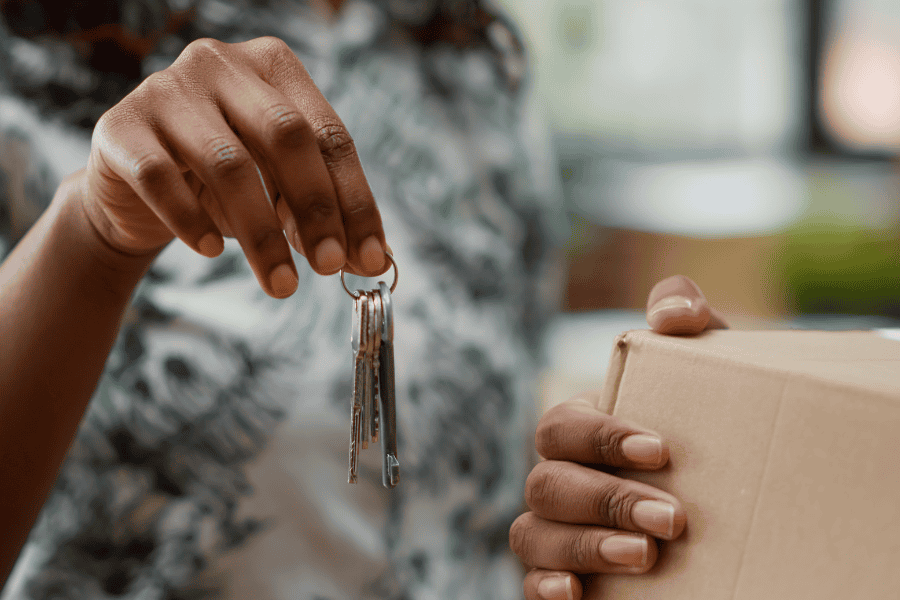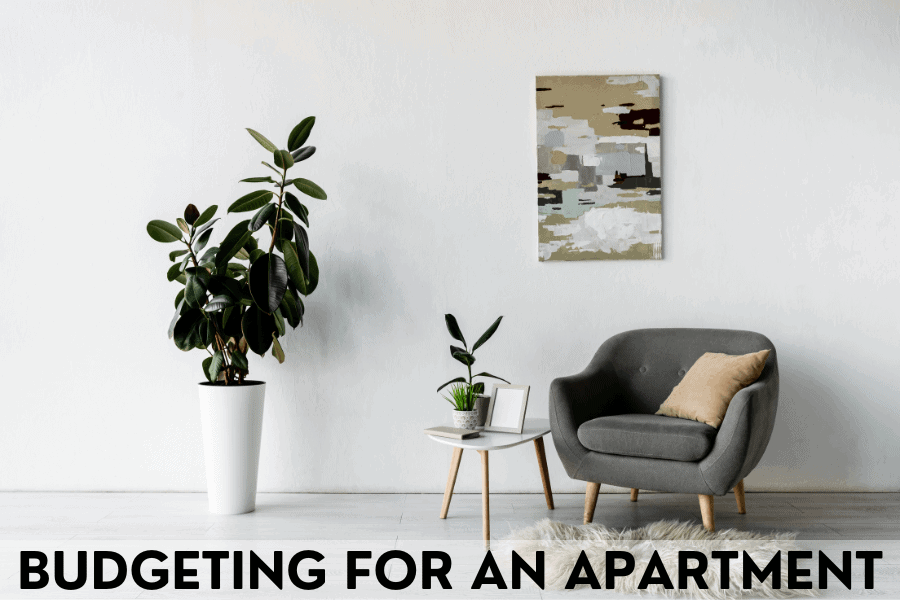Last Updated June 29, 2024 by Davina Kelly
Budgeting for an apartment can be overwhelming, especially if you are moving out for the first time.
But it doesn’t need to be, you can create a simple budget for your first apartment that is effective.
In this post, I will walk you through the essential steps to create a budget that you can stick to.
You are going to learn how to put your budget together, manage your monthly apartment expenses and the bills you have to pay and ways to save money.
After reading this post, you will be able to create a budget for your apartment that is flexible and will also help you reach all of your financial goals.
This post is all about budgeting for an apartment.
Budgeting For An Apartment – 9 Best Tips:
1. Figure Out Your Income
Before you start budgeting for your apartment, it is crucial to have a clear understanding of your income. This may sound obvious, but it is important because it will help you determine how much you can afford to pay in rent and other monthly apartment expenses.
Grab a notepad and pen or a spreadsheet and calculate your monthly income. Include your salary (after tax & deductions) and any income from side hustles, freelance work and part-time jobs. If your income fluctuates, estimate an average based on your previous earnings.
Having a clear understanding of your income is the foundation for building a realistic budget.
2. Determine Your Fixed Costs
Knowing your monthly apartment expenses and fixed costs is a very important step in creating a budget for your apartment. This will help to give you an idea of how much you can expect to spend each month. Your fixed costs are the expenses that remain consistent from month to month, making them relatively predictable.
Here are some examples of monthly apartment expenses that are usually fixed costs:
Rent
This is your biggest apartment expense. Determine how much you can afford to spend on rent without stretching your budget too thin.
As a general rule, aim to spend no more than 30% of your income on rent. Depending on your circumstances this may not be in your control, but if you can try to stay within this range.
I recommend researching the rental market in your area to find apartments within your budget.
Tip: If you choose an apartment just outside of your city your rent will be cheaper. I highly recommend this if it isn’t inconvenient for you.
Insurance
Renters insurance is often forgotten about when renting, but it is crucial for protecting your personal belongings.
Utilities
These include gas, electricity and water. Some apartments may include some utilities cost in the rent price. If the utility costs aren’t included in your rent you won’t know the exact number until you move in so for your budget you can use estimates.
Council tax (If you are in the UK)
If you live in the UK you will need to budget for council tax. The amount you pay will depend on the band you live in and how much your local council charges for that band. Read here to learn more information.
Internet
Depending on where you live you may also have to pay an installation fee for your internet, ask about this when you are shopping around. I recommend checking price comparison sites to get the best deal. This is the one I use whenever I need to renew my services.
Cable
This is optional if you don’t watch a lot of television. Opting for streaming services is cheaper and will give you more flexibility.
By calculating your fixed costs you will gain a clear understanding of the minimum amount you need to cover your monthly apartment expenses. This information will help you create a realistic budget and allow you to allocate the remaining money towards other expenses and financial goals like saving.
3. Calculate Variable Expenses
There are various variable expenses that you will need to consider for your budget. These are not specific apartment expenses, but they are essential living expenses so need to be included in your budget. They include the following.
Groceries
This is the second biggest expense for most people so it is important to include it. It will fluctuate each month so you can include an average amount.
Transportation
Whether you own a car or use public transportation you will spend money on travel.
Entertainment
It is important to include some money for fun in your budget whether that be eating out or pampering yourself. You work hard so should enjoy the fruits of your labour.
Your variable expenses will vary each month so I recommend budgeting an amount based on your previous spending.
You can do this by looking through your bank statement for the last few months to get a good picture of how much you spend in each area. Then use this information to estimate your monthly variable expenses and factor them into your budget.
4. Create Your Budget
Now that you have a clear understanding of your income and expenses, it’s time to create your budget. This part is usually where most people start to feel overwhelmed, but you can keep it simple.
You can allocate a portion of your income to cover your fixed expenses like rent and utilities and allocate the remaining amount to your variable expenses and savings.
An easy way to do this is by using the 50 30 20 budget system. This is a good system for people who are looking for an easy way to manage their money. Here is an example of how you can use this system to budget for your apartment.
- 50% of your post-tax income is allocated towards your fixed expenses
- 30% is allocated to variable expenses
- 20% is for savings and investments. This portion of your budget will go towards any financial goals you have like paying off debt and saving for retirement.
This budget method is simple and effective. I recommend using a dedicated notepad, spreadsheet or planner to help you stay organized and track your spending.
You can use my FREE printable budget planner below to put your budget together.
5. Save For Other Expenses
Moving into an apartment usually comes with one-time expenses. Here are some examples of the additional expenses you should save up for.
Security Deposit
This is usually equivalent to one month’s rent, but in some cases, it can be two month’s rent. I recommend saving two month’s rent to be on the safe side.
Furniture costs
Once you move in you will want to decorate and make your apartment feel like home. You don’t have to rush to get this done, but I do recommend saving up some money for these costs.
You can budget an estimated amount based on what you can afford. Or you can create a wish list of all the items you want and save an amount based on the total costs. Utilise platforms like Pinterest to create a vision board, then search online for items and calculate your costs from there.
Moving costs
This could include hiring movers or a rental truck. Or if you have a good friend who can help you out you may want to contribute to petrol to say thank you.
Once you know the total amount for these one-time costs you can start saving up for them. You can include the amount you need to save each month in your budget.

6. Build an Emergency Fund
Building an emergency fund is essential for financial security. When you are budgeting for an apartment I recommend including an amount to save for an emergency fund.
I recommend saving up at least three month’s worth of living expenses if you can. This will give you peace of mind because you will know that if your circumstances were to change you have a fund that can cover your living costs without going into debt.
7. Cut Back On Spending
While you are budgeting for your apartment, it is a good idea to analyse your spending and see where you can cut back. This will free up more money for savings towards your apartment and other financial goals.
Have a look at your bank statements for the last 3 – 6 months to get a good picture and go through your non-essential expenses.
Go through your subscriptions and cancel any that you are no longer using. Look at discretionary expenses like dining out, coffee, takeaways, shopping, etc and look for ways to minimise these costs.
You don’t have to go cold turkey and stop everything, but you can look for ways to cut back without sacrificing your quality of life. For example, instead of ordering takeaways, you can cook more at home.
8. Organize Your Bills
Staying organised and on top of the bills you have to pay is very important when budgeting for an apartment. It is essential for maintaining control of your finances and staying on top of your spending.
Set up a system for managing your bills. You can set up direct debits for your fixed costs and automate your savings. Also, include your bill payment due dates in your calendar to avoid late fees and penalties.
9. Adjust Where Necessary
Making adjustments is necessary when budgeting for an apartment. In the beginning, it will probably need some tweaking as you adapt to your new lifestyle. Life is constantly changing and circumstances can change unexpectedly. This will require flexibility and the ability to adapt to changes.
Whether it is a rent increase, a change in income, or unexpected expenses, being prepared to adjust your budget accordingly is key to staying on track.
Make time at least once a month to review your budget. While you are doing this ask yourself if it is working. If not identify what needs to be changed and make the adjustments as needed.
This could involve reallocating funds from one category to another, cutting back on non-essential expenses, or finding ways to increase tour income.
By being proactive and adaptable, you will ensure that your budget reflects your current financial situation and continues to support your financial goals.
Remember, the best budget is one that is agile, so don’t hesitate to make changes as needed to maintain financial stability and peace of mind.
Tips To Save Money On Your Apartment:
Downsize
Downsizing or opting for smaller apartments like a studio is a strategic move when budgeting for an apartment. This can significantly reduce your rent and utility costs, allowing you to allocate those savings towards other financial goals.
Think about your needs and explore the possibility of living in a smaller space. Adopting a minimalist lifestyle can not only save you money but also simplify your life and reduce clutter.
Go Further Out
Rent will always be higher when you are closer to the city centre, especially in big cities. I mentioned this earlier in the post, but consider expanding your search for an apartment further out from the city centre.
While living in a central location can offer more convenience, it will cost you more money. Living further away will give you more affordable housing options and you can enjoy the perks of living a more peaceful life. Do keep in mind factors such as transportation costs and commute times when making your decision.
Have Roommates
If you want an apartment but it is stretching your budget too thin why not have a roommate? This is a great way to cut down on apartment expenses.
By sharing the costs for rent and utilities with one or more roommates you will lower your individual housing expenses and make the apartment much more affordable.
I will say it is critical to choose roommates carefully and establish clear agreements regarding things like rent payments, shared expenses and even household chores.
Having clear communication and mutual respect is key to maintaining a harmonious living environment with friends while also achieving your budgeting goals.
Look For Deals
When you are budgeting for an apartment you need to become a savvy spender and look out for deals and discounts. Many landlords offer incentives such as discounted rent for signing longer leases. Take your time when researching and try to negotiate with landlords to get the best deal.
Look at other cost-saving opportunities such as utilities included in rent. If this isn’t an option installing a smart meter to get an accurate reading of what you are using can save you money each month. Also check price comparison sites for expenses like internet, cable, and insurance to ensure you are getting your services for the best price.
Frequently Asked Questions
How Much Should I Budget For My First Apartment?
It’s hard to give a number, but as a general rule, you should budget 30 – 45% of your income for rent. For example, if you make $2,500 your rent should be between $750 – $1,125 per month.
You also want to budget your estimated fixed and variable expenses. In this post, I have gone into more detail about these costs and how to budget for them.
How Do I Set Up a Budget For An Apartment?
To simplify things, you can use the 50 30 20 budget method for your apartment. This will ensure that you cover all of your expenses and work towards your financial goals. I have gone into more detail about this budget method in this post.
Final Thoughts
Budgeting for an apartment requires careful planning and discipline, but the rewards of financial stability and peace of mind are well worth the effort.
By following these steps and staying proactive in managing your finances, you will be able to confidently navigate the challenges of budgeting for your first apartment while working towards your long-term financial goals. It will also give you a feel for what life will look like when you take on your new financial responsibilities.
Remember, consistency is key, so stick to your budget and adjust as needed to ensure continued success.
I hope you have found this post helpful and can now create a budget for your apartment that works for you. What are some tips you have when budgeting for an apartment?
This post was all about budgeting for an apartment.
Other Posts You May Like:
Budgeting 101: A Simple Guide To Upgrade Your Finances
13 Best Money Saving Strategies (That Actually Work)

Davina Kelly
Hey! I'm Davina, the owner of Davinas Finance Corner. I'm passionate about finding ways to budget, save, earn more money and improve your life. After breaking free from payday loan debt and living paycheck to paycheck I want to share my experience to help other women improve their finances.
